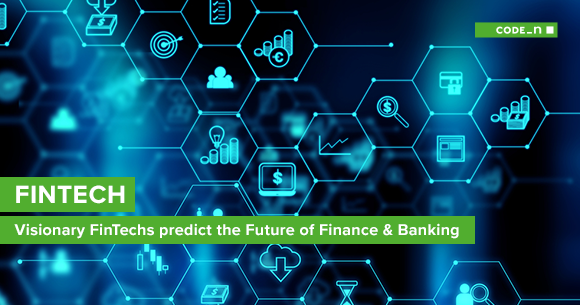"Banks are at real risk of losing their power position": FinTech feature part 1 with Meniga
Banks need to wrap up warmly – the upheaval across the whole sector has only just begun! Cryptocurrencies like Bitcoin and Ethereum are on a mission to revolutionize our monetary system,roboadvisors are superseding human financial advisors using sophisticated algorithms that predict the best personal investment strategy, or transfer money at the click of an icon on your smartphone. And this is just the tip of the iceberg. There is huge potential for disruptive concepts to take us off the beaten track into entirely new realms of banking and finance! The keys to the door for the promising FinTech startups now entering the market are customer service and automation. These two factors are defining current goals, as startups dare to challenge the hegemony of traditional financial services and the age-old banking system. How? By combining cutting-edge technologylike blockchain systems, artificial intelligence and big data, and using them to create new and enhanced services for their customers. As part of our Future of Finance and Banking series, we will be looking at this fascinating topic and speaking to some of the “revolutionaries” in the sector. Their aim will be to predict developments in this rapidly evolving market from their standpoint, lifting the lid on visionary FinTech business and gaining insights into the kind of financial world we can expect to experience in the future!

“Helping people lead better financial lives.” Let’s start in the Icelandic FinTech community with the CODE_n alumnus Meniga. Helping people is central to their brand promise! But instead of trying to dethrone banks like so many other FinTechs, their aim is to support them 😉 How? By enhancing service and leveraging the value of transaction data. The FinTech has a wealth of interesting market insights to share with us, along with a variety of expert opinions that are certainly worth hearing. Discover why they believe in open data and why they feel the degree of customer engagement will be central to which players come out on top.
Lisa: What are the obstacles and challenges faced by banks these days?
Meniga: In our view, the biggest disruptive threat banks face today is the risk of customer dis-intermediation. Banks are not just competing with banks anymore. With tech giants such as Google, Amazon, and Apple – as well as thousands of fintech and social media players such as Facebook, Snapchat, WeChat and others placing themselves between the banks and their customers – banks are at a real risk of losing their position of power as the number one go-to place for financial services. The most common starting point for social media players entering financial services is mobile payments and peer-to-peer money transfers. For example, users of the mobile messaging service offered by Snapchat can now send money to each other via the Snapcash feature. Their success has given them the confidence to move into digital banking — Facebook and Google are offering similar features and Apple’s move into mobile payments is well documented. Banking is moving more and more away from traditional sectors into digital channels, especially the mobile channels, and it’s there that the tech giants, fintechs, and social media players are much better at customer engagement. Banks need to rethink their approach to customer engagement and focus more on a personalized and habit-forming digital user experience by using data – similar to their new competitors.
Lisa: What will the banking sector look like in five years? As a startup operating in this field, please tell us a little bit about the trends and topics.
Meniga: There are two words that will really define the banking sector in the next five years and those words are “Open Data.” The revised European Payment Services Directive (PSD2) is driving European banks to a defining moment from the beginning of 2018. PSD2 signals a significant shift in the balance of power in European retail banking, opening the door to innovative fintech companies and setting the financial services industry on a journey toward open banking. With PSD2, the consumer decides who may access their data and who may authorize payments from their accounts. This means fintech companies and tech giants will benefit from the enhanced and regulated ability to build financial management and payment services applications to go on top of customer banking data. Although PSD2 will only impact European banks, there’s a global shift in the same direction and more markets will likely introduce similar regulations. This new world of open data in banking will put more pressure on banks to provide a better user experience to retain their customers. So we expect the next five years to be quite interesting in the banking sector while banks re-shape their business models and their approach to customer engagement, not just in order to compete in this new landscape of financial services but also to take on these new players. Our view is that the future of banking is a beautifully designed and personalized mobile app where actionable insights, advice, and fun facts are offered in combination with tailored savings and relevant product recommendations – with everything integrated into everyday banking.

Meniga participated in the CODE_n CONTEST and the overall CEBIT tradeshow in 2012.
Lisa: How will Meniga contribute to disruption in the banking sector?
Meniga: We like to think of ourselves as sitting on the agile and innovative fintech side rather than chipping away at the banks. So we try to help them weather the storm. Our passion is to make digital banking a drastically better environment and user experience than it is today. By doing so, we’re helping banks utilize their data to create meaningful customer engagement and develop new business models, but most importantly we’re helping banking customers lead better financial lives. Financial literacy, or actually a lack of it, is one of the leading causes of misery in the world. Meniga brings substantial value to people and families, wherever they are in the world, through innovative solutions. A lot of people across the globe can substantially improve their financial habits and we’re on a mission to help them with this. Our solutions help them understand and control their finances as well as make the most of the money they have – with the least possible effort – making a real impact on the quality of their lives. People are different and their needs are changing so our job is to continuously innovate with clever solutions that really understand the needs of people and how they engage with their finances. Working with data and the psychology that underlies customer engagement will play a big role in helping banks be better to their customers, and that’s where we consider ourselves to be the leading experts in this area.
Lisa: Thank you for sharing this sophisticated market assessment with our readers!
We also recommend Meniga’s FinTech insight series paper, Meaningful Engagement In Digital Banking, which is available for download here.
But will banks and traditional financial service overcome the revolution? An insightful panel at new.New Festival in 2016 discussed the topic. Watch the video of “FinTechs vs. Banks – Threat or Opportunity?”
Of course the question is: Will banks and traditional financial service providers survive this revolution? We’ll keep you posted with more expert opinions from the visionary FinTechs we are pulling together in the CODE_n Community. Part 2 of the Future of Banking series is out soon! Next time we’ll be getting some exclusive insights from Kantox, Blockchain HELIX and fino digital.






Comments